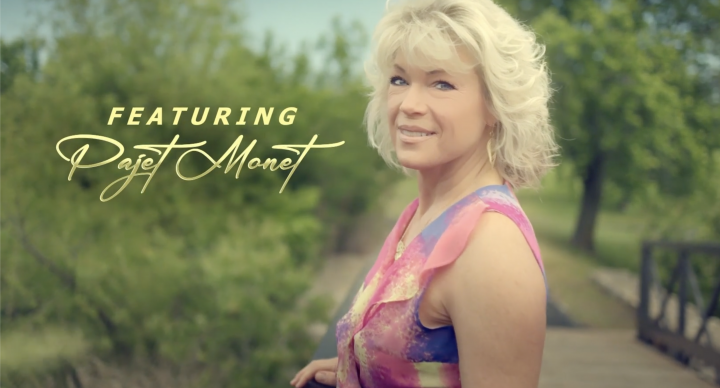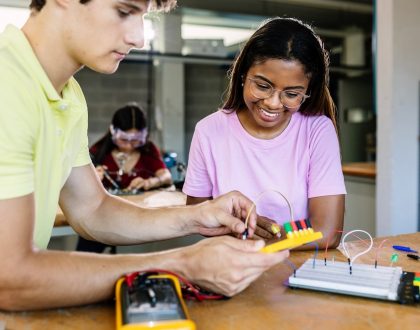High School Emotional Intelligence I

Course Features
Course Details
Course Overview
The High School Emotional Intelligence Course, featuring Pajet Monet, is designed to empower students with the skills and knowledge to enhance their emotional well-being, build meaningful relationships, and make a positive impact on the world. Through a comprehensive exploration of topics such as self-care, exercise, nutrition, relationships, hygiene, discipline, happiness, social media, attitude, and personal growth, students will develop strategies to manage emotions, foster resilience, and cultivate a thriving mindset. This course combines practical tools, reflective activities, and inspirational stories to guide students toward a balanced and fulfilling life.
Sample Lesson - Introduction
 This course was developed by the International Academy of Science.
Learn More
This course was developed by the International Academy of Science.
Learn More
Scope and Sequence
Unit 1: Tools to Help Us Feel Well In this unit, students will explore foundational strategies for emotional and physical well-being, learning to identify tools and habits that promote a balanced lifestyle. They will discover the purpose of emotional intelligence tools, recognize strategies to enhance emotional health, and understand the roles of supportive individuals in their lives. Students will also examine the benefits of exercise, nutrition, sleep, and positive thinking, as well as how a motivational point system can encourage healthy behaviors. By the end of the unit, students will be equipped with practical approaches to foster their overall well-being.Unit 2: Exercise for a Better Life This unit focuses on the transformative power of exercise in enhancing emotional and physical health. Students will learn the benefits of maintaining muscle, explore exercise routines that boost mood, and reflect on their personal attitudes toward physical activity. They will also investigate the role of nitric oxide in health, the connection between nutrition and movement, and how exercise builds confidence. Through inspirational stories, such as a baseball player’s journey, and a progress checkup, students will develop a deeper appreciation for incorporating movement into their daily lives.
Unit 3: Relationships In this unit, students will develop skills to build and maintain healthy relationships, both with others and themselves. They will learn the qualities of a supportive friend, effective listening skills, and behaviors that reflect humility, kindness, and sincerity. Through reflective exercises, such as examining their texting habits, and stories like “A Man and His Dog,” students will explore strategies to manage shyness, foster teamwork, and cultivate a positive self-relationship. By the end, students will understand how to nurture meaningful connections that support their mental and emotional health.
Unit 4: Hygiene This unit emphasizes the importance of personal and emotional hygiene for overall well-being. Students will learn practices for maintaining good personal hygiene, creating organized environments, and establishing healthy bedtime routines. They will also explore the concept of emotional hygiene, discovering strategies to keep their mental health in check, and the benefits of periodic fasting. By examining the social and health advantages of hygiene and the role of manners, students will develop routines that enhance their confidence and interpersonal interactions.
Unit 5: Food In this unit, students will explore the critical role of nutrition in supporting physical and emotional health. They will learn to identify the effects of salt, sugar, and ultra-processed foods, as well as the benefits of whole, unprocessed foods and prioritizing vegetables. Through reflective activities, such as examining their relationship with food, and lessons on misleading marketing claims, students will develop the skills to make informed food choices. A progress checkup will help them track their journey toward healthier eating habits.
Unit 6: Living a Good Life This unit encourages students to cultivate a fulfilling life through mindfulness, positive thinking, and social connections. They will learn the benefits of mindfulness practices, exercise techniques that enhance mood, and strategies for fostering gratitude and self-esteem. Through stories like “The Birds” and lessons on the emotional benefits of nature, students will explore how to avoid arrogance and build confidence. By comparing arrogance, confidence, and self-esteem, they will develop a balanced approach to personal growth and well-being.
Unit 7: Food - Support Physical and Mental Well-Being Building on the previous food unit, students will dive deeper into the nuances of nutrition and its impact on thriving. They will learn the nutritional benefits of colorful foods, the health advantages of eating fish, and how to interpret nutrition labels. Lessons on polite dining behaviors, naturally sweet foods, and the concept of “zombie cells” will provide a holistic understanding of how food choices support physical and mental well-being. By the end, students will have a comprehensive view of how to sustain a healthy lifestyle through nutrition.
Unit 8: Discipline This unit focuses on the role of discipline in achieving personal goals and maintaining well-being. Students will learn the importance of self-control, mental flexibility, and eliminating negative habits, such as excessive video gaming. They will explore how physical health influences mental attitude and the effects of toxic substances. Through lessons on moderation, disciplined manners, and an inspirational story about a painter, students will develop strategies to stay focused and resilient in their daily lives.
Unit 9: Happiness In this unit, students will explore the components of happiness and strategies to cultivate it in their lives. They will learn to recognize signs of emotional overwhelm, the benefits of gratitude, and the negative impacts of blaming or judging others. Through lessons on managing anger, the emotional benefits of smiling, and the influence of movies on emotions, students will develop tools to harness their emotions effectively. A story about orange trees and a progress checkup will help them reflect on their journey toward sustained happiness.
Unit 10: Social Media/Relationships This unit examines the intersection of social media and relationships, teaching students how to navigate digital interactions with respect and empathy. They will learn to identify the impacts of social media, manage negative influences, and recognize non-verbal communication cues. Through stories like “Made Up Judgments” and “The Truck,” students will explore perspective-taking and the elements of healthy relationships. By the end, they will understand the importance of social connections and how to foster them in both online and offline contexts.
Unit 11: Attitude In this unit, students will explore how attitude shapes emotional well-being and interpersonal interactions. They will learn the emotional benefits of laughter, the impacts of inauthentic behavior, and how emotions, actions, and relationships are interconnected. Students will also identify personal strengths, the role of hope, and the benefits of connecting with nature to foster a positive attitude. Through lessons on managing anger and developing observational skills, along with a progress checkup, students will cultivate practices that promote a thriving mindset.
Unit 12: Great People? This unit inspires students to recognize the qualities that define influential individuals and apply those traits to their own lives. They will learn the importance of grit, determination, resilience, and personal accountability in achieving success. Through stories like “True Grit” and “Alex and His Sister,” students will explore the value of commitment, integrity, and perseverance. By examining the concept of interdependence, they will understand how collaboration and persistence contribute to personal growth and meaningful accomplishments.
Unit 13: Your Impact on the World? In this unit, students will reflect on their potential to make a positive impact on the world. They will learn the qualities of a positive volunteer attitude, define personal goals for creating change, and explore how to handle criticism constructively. Through stories like “Mr. Nobel” and lessons on overcoming self-criticism, students will understand the value of hard work, responsibility, and learning from perceived failures. By the end, they will be motivated to take ownership of their actions and contribute to their communities.
Unit 14: Selflessness and Communication This unit focuses on fostering selfless behaviors and effective communication to strengthen relationships. Students will learn to express kindness, recognize others’ contributions, and practice active listening. They will explore the emotional impacts of withholding forgiveness, the characteristics of positive communication, and how expectations influence interactions. Through lessons on respect and avoiding selfish behavior, students will develop skills to build trust and empathy in their relationships, enhancing their emotional intelligence.
Unit 15: Enjoying Life In this unit, students will discover ways to find joy and meaning in everyday life. They will learn how patterns in nature, seasonal changes, and gratitude practices inspire positive emotions. Students will also explore the benefits of acknowledging emotions and understanding how feelings impact daily experiences. Through metaphors like “A Flickering Candle,” they will reflect on strategies to cultivate happiness and maintain emotional balance, fostering a deeper appreciation for life’s simple pleasures.






